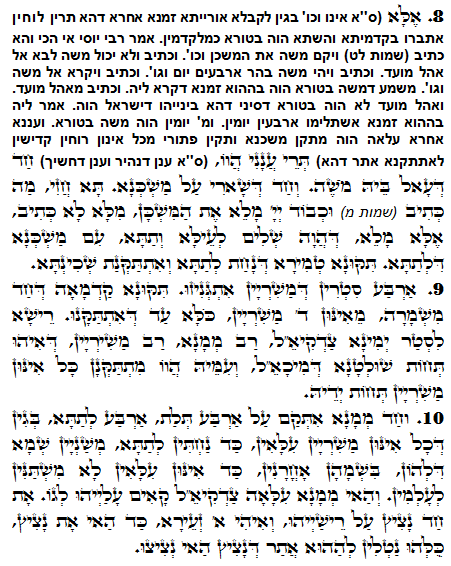Daily Zohar # 1452 – Vayikra – Speaking angels

Hebrew translation:
9. אַרְבָּעָה צְדָדִים שֶׁל מַחֲנוֹת נִגְנְזוּ. תִּקּוּן רִאשׁוֹן שֶׁל מִשְׁמָרָה אַחַת מֵאוֹתָן אַרְבַּע מַחֲנוֹת, הַכֹּל עַד שֶׁהִתְתַּקְּנוּ. הָרִאשׁוֹן לְצַד יָמִין צַדְקִיאֵ”ל, הַמְמֻנֶּה הַגָּדוֹל, גְּדוֹל הַמַּחֲנוֹת, שֶׁהוּא תַּחַת שִׁלְטוֹנוֹ שֶׁל מִיכָאֵ”ל, וְעִמּוֹ הָיוּ מִתְתַּקְּנִים כָּל אוֹתָם הַמַּחֲנוֹת תַּחַת יָדוֹ.
10. וּמְמֻנֶּה אֶחָד הוּקַם עַל אַרְבַּע שָׁלֹשׁ, אַרְבַּע לְמַטָּה, לְפִי שֶׁכָּל אוֹתָם הַמַּחֲנוֹת הָעֶלְיוֹנִים, כְּשֶׁיּוֹרְדִים לְמַטָּה, מְשַׁנִּים אֶת הַשֵּׁם שֶׁלָּהֶם בְּשֵׁמוֹת אֲחֵרִים. כְּשֶׁהֵם עֶלְיוֹנִים, לֹא מִשְׁתַּנִּים לְעוֹלָמִים. וְהַמְמֻנֶּה הָעֶלְיוֹן הַזֶּה צַדְקִיאֵ”ל עוֹמֵד עֲלֵיהֶם לְפָנִים. אוֹת אַחַת נוֹצֶצֶת עַל רָאשֵׁיהֶם, וְהִיא א קְטַנָּה. כְּשֶׁהָאוֹת הַזּוֹ נוֹצֶצֶת, כֻּלָּם נוֹסְעִים לְאוֹתוֹ מָקוֹם שֶׁנּוֹצֶצֶת הַהִתְנוֹצְצוּת הַזּוֹ.
Zohar Vayikra
The Holy Ari in the beginning of “Gates of the Holy Spirit” “שער רוח הקודש” said that with every word that comes out of our mouths we create an angle; positive or negative depending on the word. The positive angles help us in time of need and the negative angels create blockages when we don’t need them.
The letters of the Torah and the words we hear from the reader on Shabbat are very important connections for us to draw the necessary energy from the reading. When we hear the process of sacrifices in the Tabernacle to cleanse a person from impurity, we also connect to the same energy.
Hosea 14:3
“קְחוּ עִמָּכֶם דְּבָרִים, וְשׁוּבוּ אֶל-יְהוָה; אִמְרוּ אֵלָיו, כָּל-תִּשָּׂא עָוֹן וְקַח-טוֹב, וּנְשַׁלְּמָה פָרִים, שְׂפָתֵינוּ”
“Take with you words and return to YHVH; say to him, “Take away all iniquity; accept what is good, and we will pay with bulls the vows of our lips.”
This verse means that the power of the words are like the sacrifices in the Holy Temple. Since we don’t have access to the Holy Temple, we cannot bring sacrifices to the Kohen to remove any negativity from ourselves. We read and recite the process that was done in the Temple and with that, connect to that cleansing energy.
With this knowledge and the Ari’s teaching on creating angels with our words, we can begin to understand the reason for all the different prayers we recite on a daily basis, Shabbat and Holidays.
{||}

 Previous: Vayikra
Previous: Vayikra
